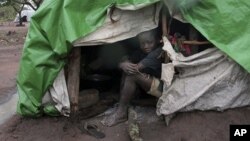The beginning of the rainy season raises the risk of cholera and dysentery. These are infections of the intestines that can cause cramps, severe diarrhea, dehydration… and sometimes even death.
The diseases can be spread when flood waters carry human waste. And even after the rain ends, the tiny organisms that cause the diseases can continue to live on in stagnant pools of water. That’s why it’s so important to you and your family not to eat contaminated food or drink bad water.
Only drink bottled water, or water that’s been boiled or purified. Peel raw fruits and vegetables before eating them, or, even better, cook them for at least 5 minutes and eat them while they are still hot. Finally, make sure you wash your hands with soap and water before eating. Taking these steps will help you and your family avoid serious disease.
The diseases can be spread when flood waters carry human waste. And even after the rain ends, the tiny organisms that cause the diseases can continue to live on in stagnant pools of water. That’s why it’s so important to you and your family not to eat contaminated food or drink bad water.
Only drink bottled water, or water that’s been boiled or purified. Peel raw fruits and vegetables before eating them, or, even better, cook them for at least 5 minutes and eat them while they are still hot. Finally, make sure you wash your hands with soap and water before eating. Taking these steps will help you and your family avoid serious disease.






